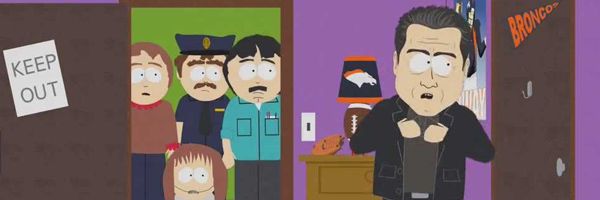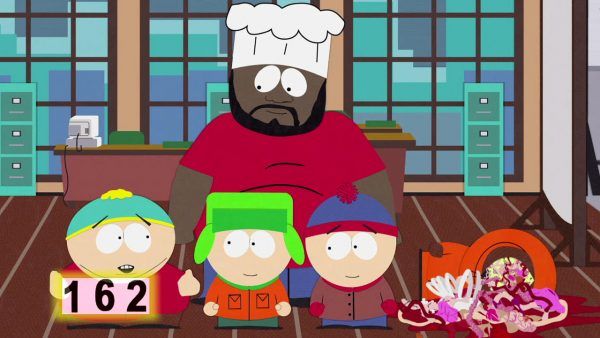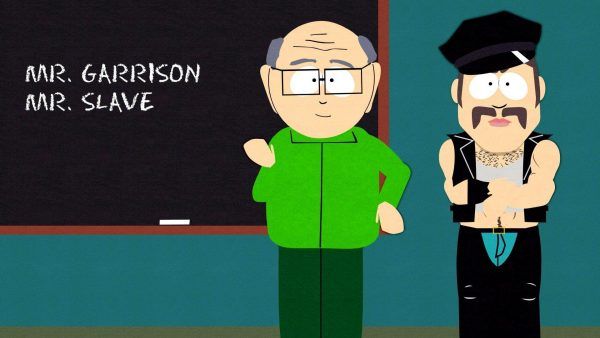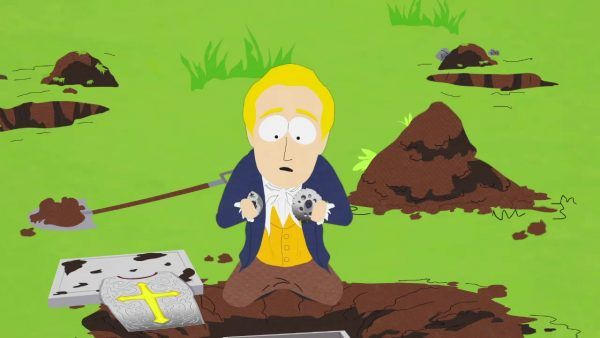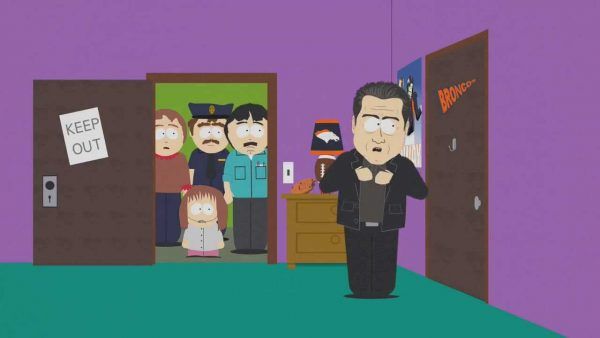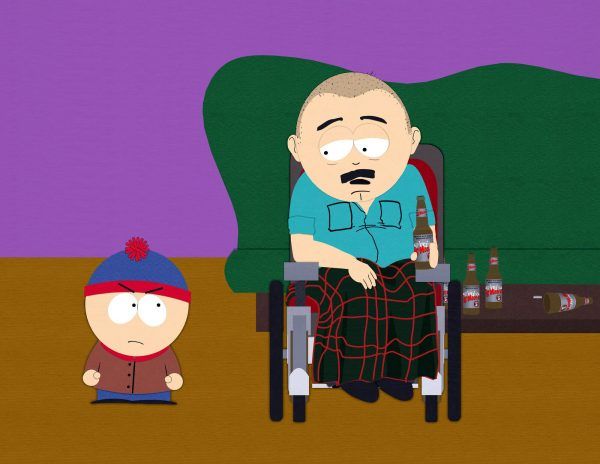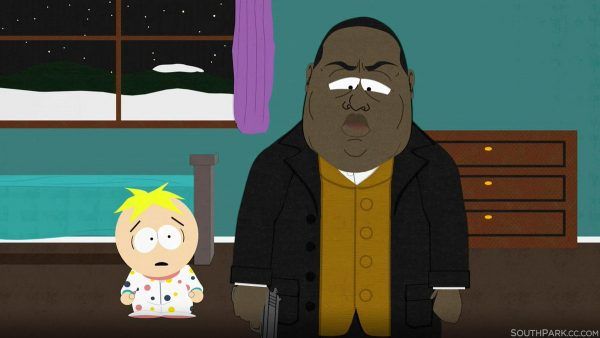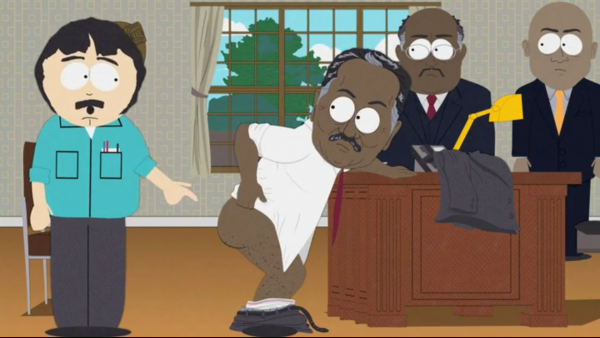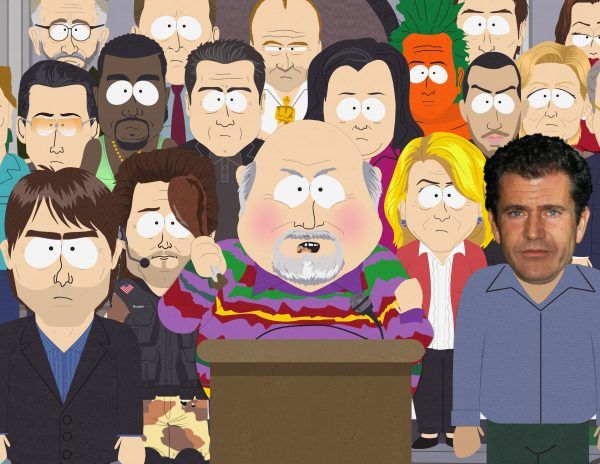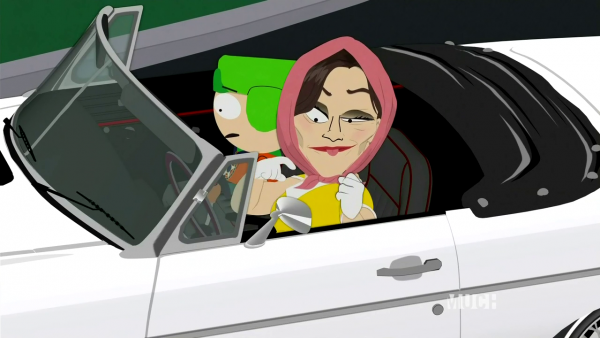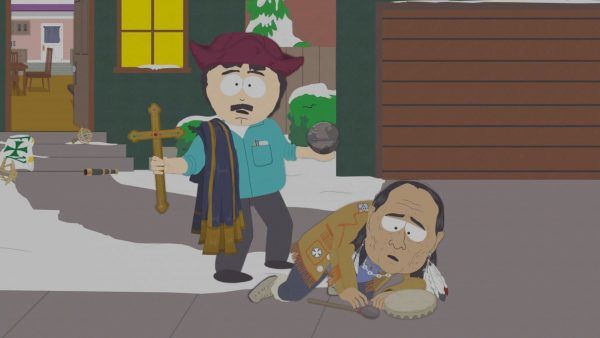Let’s take a moment to fully appreciate how much the world has changed since South Park first premiered in 1997: Bill Clinton was still president, and his sex life had not yet become an object of national fascination. The Daily Show was barely a year old, and Craig Kilborn was the host. California had just become the first state in the U.S. to legalize medical marijuana. Gay marriage was still a distant pipe dream. Titanic had not yet taken over the world. No Columbine. No Bush/Gore election fight. No 9/11. No Patriot Act. No opioid crisis. No Facebook or MySpace or Instagram. No celebrity sex tapes. No Family Guy or Archer or Rick and Morty or BoJack Horseman. No Obama. No President Trump.
America was a different place. Less cynical, less evolved, less comfortable discussing taboo subjects in the public sphere, still clinging to a petty puritanical prudishness and a false sense of exceptionalism. So when Trey Parker and Matt Stone unleashed their crudely animated cartoon about four foul-mouthed children and their misadventures in a small Colorado mountain town, people were shocked—by the profanity, the violence, the disrespect, the gleeful flouting of polite norms. At first, the show was content to live in the sandbox of largely apolitical toilet humor, but as the world got more complicated, South Park became a cultural beacon, shining a light on the issues of the day from week to week through increasingly pointed Swiftian satire that made sport of gathering our sacred cows together and shooting them for laughs. South Park became a mirror that reflected the state of things, and, in its 23rd season, it’s still going strong today—and as recently as this week caused uproar from an entire country.
There was a time when every single week brought a new statement of condemnation against the show from some aggrieved party; determining the most controversial episodes of a show whose bread and butter is offense is a tall order, to say the least. Without overthinking it, here are 10 of the funniest, most fucked up, most memorable instances of South Park courting controversy. With two notable exceptions, all of these episodes are available for streaming on Hulu.
“It Hits the Fan”
Season 5, Episode 1
June 21, 2001
Water cooler conversation is abuzz in South Park after the network show Cop Drama airs the word “shit” uncensored. With the curse word effectively normalized, everyone in town starts saying it, until the boys discover that a series of grisly deaths are connected to all the gratuitous S-bombs. Soon the Knights of Standards and Practices are awakened and descend on South Park to eradicate the word.
Lampooning the CBS drama Chicago Hope’s then-recent airing of “shit” (a ratings stunt that made a must-see TV out of a single utterance of the verboten word), “It Hits the Fan” marked the first time Comedy Central allowed South Park to air “shit” uncensored, which it did—162 times. Though it garnered no real controversy, at least not on the level of these other episodes, it was a significant turning point in the culture for basic cable standards. All the “shits” and “fucks” you hear on FX and AMC now? You can thank South Park.
“The Death Camp of Tolerance”
Season 6, Episode 14
November 20, 2002
Mr. Garrison tries to goad Principal Victoria into firing him for being too gay so he can sue the school for discrimination and get a big pay out. To do this, he resorts to a series of offensive displays, including sending the class gerbil Lemmiwinks up the ass of his new assistant, the leather-clad masochist Mr. Slave, in front of the entire fourth grade. After the kids complain about Garrison’s behavior, they’re sent to the Museum of Tolerance for a dose of compassion. When that doesn’t work, they’re sent for re-education in the Death Camp of Tolerance, where a Nazi-like German soldier forces them to fingerpaint pictures of racial harmony. Meanwhile, we follow Lemmiwinks as he attempts to escape Mr. Slave’s digestive system.
Though the episode’s message about tolerance vs. acceptance feels a bit retrograde by today’s standards, “The Death Camp of Tolerance” is remarkable for still being one of the grossest South Parks ever, with a graphic depiction of Mr. Slave taking Lemmiwinks in the ass followed by several extreme close-ups of his sphincter (seen from both internal and external vantage points).
“All About Mormons”
Season 7, Episode 12
November 19, 2003
There’s a new kid in South Park named Gary Harrison, and the boys hate him. On the playground, Stan is sent to beat him up, but discovers that Gary is actually a really nice guy. Stan ends up at his house for dinner, where he learns that the Harrisons are practicing Mormons. After the chipper family shares with Stan the story of Mormonism’s founding, Randy pays them a visit with the intention of telling them not to proselytize to his son. But when he discovers that the Harrisons are really, really nice people, Randy decides that he and his family should be Mormons, too.
As they would later do with Scientology in “Trapped in the Closet,” Parker and Stone animate the actual history of the religion, reveling in the absurdity of its origin mythology and implicitly criticizing its followers for believing such nonsense, though the Harrisons are depicted as incredibly kind, moral people. The LDS Church issued a statement calling the episode “gross” but stopped short of demanding an apology or the cancellation of re-runs. On a side note, when Parker and Stone took their Mormon jokes to Broadway years later with the smash hit Book of Mormon, the church proved itself a good sport by taking out Playbill ads with the headline “You’ve seen the play. Now read the book.”
“Trapped in the Closet”
Season 9, Episode 12
November 16, 2005
After Stan is recruited into Scientology and declared the second coming of L. Ron Hubbard, church followers, including Tom Cruise and John Travolta, descend on South Park with the hope of meeting their new savior. But when Stan insults Cruise, the crestfallen actor locks himself in Stan’s closet, triggering a slew of double entendres as a concerned public tries to convince Cruise to finally, uh, come out of the closet. Meanwhile, R. Kelly bears witness in song.
It’s easy to forget that not so long ago, before a handful of intrepid journalists and celebrity defectors exposed Scientology to the full light of day, the core beliefs of the religion and its various abuses were still largely unknown to the general public, fiercely guarded by church leadership. So it’s not exactly surprising that Comedy Central abruptly scrapped a re-airing of the episode in early 2006 on the eve of Cruise’s press tour for Mission: Impossible III. Not only did Parker and Stone take aim at Cruise’s sexuality, they devote an entire segment of the episode to depicting the secretive (and absurd) foundational mythology of the religion—a “sacred” story normally reserved for advanced members of the church—accompanied by a title card reading “THIS IS WHAT SCIENTOLOGISTS ACTUALLY BELIEVE.” Though the network and Cruise both denied it, it was widely reported that Cruise had threatened to boycott promoting the film (which was distributed by Paramount, Comedy Central’s sister company under Viacom) if the network didn’t scrap the re-run, and Isaac Hayes (the voice of Chef), a Scientologist himself, quit the series over the episode.
“Bloody Mary”
Season 9, Episode 14
December 7, 2005
Randy gets a D.U.I. and is ordered by the court to attend AA meetings. When he finds out from the group that alcoholism is a disease he’s powerless to control, he leans in and soon becomes wheelchair-bound and perpetually drunk. Meanwhile, in the nearby town of Bailey, a statue of the Virgin Mary has begun bleeding out of its ass, and Randy and Stan head there with the hope that the blood will heal Randy of his affliction. The Catholic Church at first declares the bleeding a miracle, but when the statue sprays Pope Benedict in the face, his holiness determines that the statue is actually menstruating and therefore not a miracle, because, “chicks bleed out their vaginas all the time.”
Just in case the blasphemous depiction of Catholic iconography wasn’t enough, Parker and Stone timed the episode to air on the eve of the Feast of the Immaculate Conception, a Catholic observance centered on the Virgin Mary. American watchdog group the Catholic League had a conniption fit, demanding an apology and the “permanent retiring” of what they described as a “vile” episode. But it wasn’t just American Catholics who were offended—a handful of religious organizations in New Zealand banded together and demanded (unsuccessfully) that the episode be pulled.
Ultimately, Comedy Central partially acquiesced to the Catholic League’s demands, canceling the first scheduled re-run, and Viacom board member Joseph Califano, a practicing Catholic, issued his own sternly worded condemnation of the episode. However, in August the following year, the network re-aired the episode, and it’s currently available to stream on Hulu.
“Hell on Earth 2006”
Season 10, Episode 11
October 25, 2006
Inspired by MTV’s My Super Sweet 16, Satan plans a blowout Halloween party on earth, but everything keeps going wrong. Meanwhile, the boys summon Biggie Smalls from the dead, who’s pissed that his journey to the party is now complicated by the fact that he’s alive.
Though many of the series’ envelope-pushing controversies are in service to a larger satirical point, South Park often hits below the belt just for the fun of it, as it did in this episode. When Satan’s party finally happens, one of the guests is Steve “The Crocodile Hunter” Irwin, who shows up with a stingray hanging out of his chest. Horrified guests mistake him for an insensitive partygoer dressed as the TV host, who had been killed by a stingray mere weeks before the episode aired. A friend of Irwin’s widow issued a statement condemning the episode as cruel, a criticism echoed by various media pundits.
“With Apologies to Jesse Jackson”
Season 11, Episode 1
March 7, 2007
As a contestant on Wheel of Fortune, the ever-clueless Randy gets in serious hot water when he makes a very wrong guess in trying to solve the puzzle of N_GGERS, whose clue is “People Who Annoy You.” The correct answer: “Naggers.” Randy’s guess? You can probably guess. Soon, the entire town of South Park is scandalized as Randy becomes a target of national derision and is labeled the “N***er Guy.” In an effort to atone for his mistake and rehabilitate his image, Randy visits Jesse Jackson and literally kisses his ass, starts the Randy Marsh African American Scholarship Foundation, and along with a trio of disgraced N-word users (Michael Richards, Mark Furhman, and Dog the Bounty Hunter), successfully lobbies Congress to ban utterance of the phrase “N***er Guy.”
In South Park’s long, storied history of courting controversy, this episode should be one of the riskiest. Parker and Stone tap-dance across the narrow minefield between pointed satire and gratuitous cruelty: the N-word is uttered, un-bleeped, 43 times, Jesse Jackson is depicted as the self-appointed “Emperor of Black People,” and a subplot involving sensitivity training at South Park Elementary has Cartman laughing uncontrollably at a counselor with dwarfism. But Kovon and Jill Flowers, co-founders of the NAACP-linked organization Abolish the N-Word, praised the episode, saying it helped to educate people on the power of the word and “how it can feel to have hate language directed at you.” Only the Parents Television Council (PTC) objected. In an astounding display of tone-deafness, L. Brent Bozell, the very white founder of PTC, criticized Flowers’s praise of the episode, whined about the lack of protest compared to when conservative radio host Don Imus used the word, and named it “The Worst Cable Content of the Week.”
“200” and “201”
Season 14, Episodes 5 and 6
April 14 & 21, 2010
In the 200th and 201st episodes of South Park, a large group of celebrities lampooned by the show throughout the years band together to file a class action lawsuit against the town for defamation. But Tom Cruise promises they’ll drop the lawsuit if he’s granted a meeting with the prophet Muhammad. Problem is, Muhammad doesn’t like the spotlight.
You won’t find these two episodes (legally, at least) anywhere online. Though, like other religions, Islam has been a frequent target of the show, and Muhammad was previously depicted in the Season 5 episode “Super Best Friends,” “200” and “201” were deemed too dangerous by Comedy Central after their depiction of Muhammad’s likeness (forbidden in Islam) prompted threats of violence from religious extremists online. The episodes never re-ran, and the network stopped streaming them online soon after their initial airings, even pulling the digital copies that had been purchased to own. (At the same time, they also retroactively pulled the years-old “Super Best Friends” for the same reasons). To this day, the only way to view the episodes is on DVD or Blu-ray.
“Stunning and Brave” and “PC Principal Final Justice”
Season 19, Episodes 1 and 10
September 16 and December 9, 2015
For the first time in the series’ history, South Park committed to a season-long narrative arc. In “Stunning and Brave,” the season 19 premiere, Principal Victoria is fired after a student refers to rape as “a hot Cosby.” She’s replaced by PC Principal, a goateed, Oakley-wearing, Powerade-chugging bro who loves drinking beer, working out, and “that feeling you get when you rhetorically defend a marginalized community from systems of oppression.” PC Principal is hellbent on instilling a new level of sensitivity in the woefully backwards town, and he’ll use violence if necessary. When word gets out that Kyle doesn’t think Caitlyn Jenner is a hero, PC Principal gives him two weeks detention. When Cartman attempts to blackmail PC Principal by framing him for child abuse, PC Principal beats the shit out of him—not for the blackmail, but for off-handedly using the culturally insensitive word “capeesh” as he’s threatening him.
By the finale, “PC Principal Final Justice,” Season 19 had expertly threaded a series of disparate cultural concerns and issues—political correctness run amuck, gentrification in the name of revitalization, inescapable online advertising, and the country’s obsession with guns—into a cutting, poignant, and hilariously dead-on portrait of 2015 America.
This is peak South Park. As a satire, the show has never been sharper, funnier, or more consistent than Season 19—the last to air before the election of Donald Trump made the show’s job a hell of a lot harder—and it might very well go down in history as the series high point.
“Holiday Special”
Season 21, Episode 3
September 27, 2017
School cancels Columbus Day due to outcry from parents over Columbus’s abuses of Native Americans. Randy leads the charge, shaming anyone who shows even a hint of affinity for Columbus. But when his own past as a Columbus superfan is exposed, Randy frantically attempts to align himself with the plight of Indigenous people by kissing a Native American and taking a DNA test to prove his bloodline bona fides.
Amid Elizabeth Warren’s claims of Native American heritage, the mass migration of white helpers to Standing Rock, and the proliferation of ancestry DNA tests, “Holiday Special” viciously skewered hypocritical white people who seek moral superiority by aligning themselves with victimized minorities. Randy’s seduction and subsequent shunning of a Native American man is a perfect metaphor for the way a certain kind of white person will swoop in as an ally when convenient, feel good about themselves, and then abandon the cause as quickly as they picked it up, and Randy’s secret past as a Columbus fan hammers home the way virtue-signaling is often deployed to cover and compensate for past offenses. While the episode didn’t cause much of a scandal, it’s one of the show’s most outrageous and cutting moments of the last several years.

